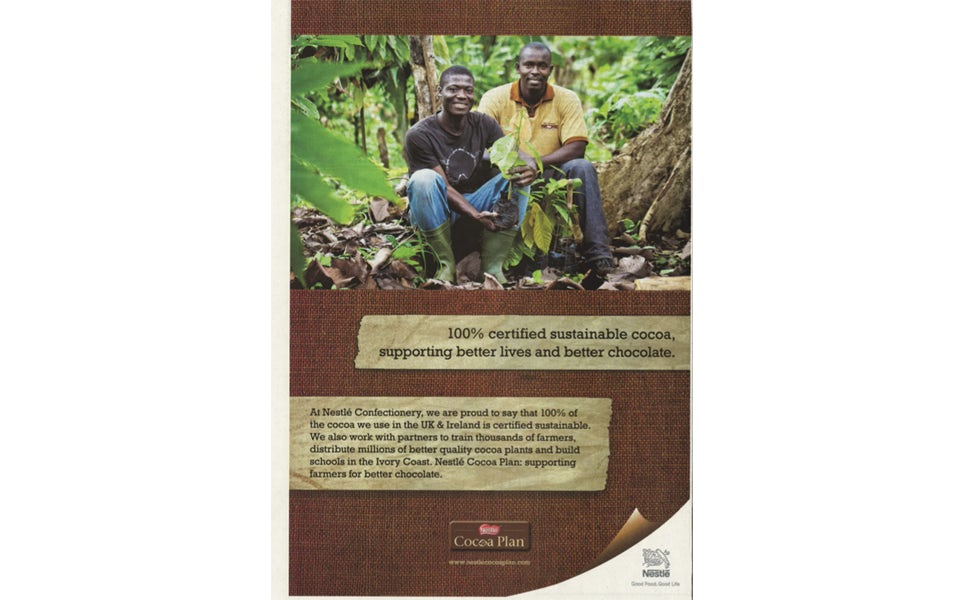Nestlé rolls out first brand campaign for its sustainable cocoa initiative
Nestlé kicked off the first brand campaign for its ‘Nestlé Cocoa Plan’ as it looks to talk up its sustainability efforts and highlight how it has achieved its goal of sourcing 100% sustainable cocoa for its confectionary and biscuits.

The ad, which was placed in The Sunday Telegraph over the weekend, states: “At Nestlé Confectionary, we are proud to say that 100% of the cocoa we use in the UK and Ireland is certified sustainable. We also work with partners to train thousands of farmers, distribute millions of better quality cocoa plants and build schools in the Ivory Coast. Nestlé Cocoa Plan: supporting farmers for better chocolate.”
Nestlé announced in December last year that it had reached its target to source 100% sustainable cocoa for its chocolate confectionery and biscuits, becoming the first major confectionery company in the UK and Ireland to do so.
As a result, the entire range of Nestlé’s chocolate confectionery and biscuits sold in the UK and Ireland, including KitKat, Aero and Smarties, is now produced using certified sustainable cocoa.
At the time, Andrew McIver, managing director confectionery at Nestlé UK and Ireland said: “In achieving this landmark milestone, Nestlé UK and Ireland is demonstrating its long-term commitment to making a real difference to cocoa farmers and their communities.
“The Nestlé Cocoa Plan is helping farmers to run profitable farms, support the elimination of child labour and ensure a sustainable supply of cocoa. Consumers here in the UK can enjoy their favourite products with the confidence that they are made with cocoa that comes from 100% certified sustainable sources”.
Nestlé UK and Ireland works with both UTZ Certified and the Fairtrade Foundation for independent certification that the cocoa is sourced and produced sustainably on farms with safe working conditions.
The UTZ program is designed to improve producers’ lives and offer a flexible and cost efficient sustainability programme to the industry. UTZ certified farmers are trained to grow better crops, generate more income and create opportunities for their families whilst protecting the environment. Companies, on the other hand, are able to secure their supply in the future.
In 2009, Nestlé announced that over the next 10 years it would invest CHF 110 million into plant science and sustainability initiatives as part of its broader Nestlé Cocoa Plan, which was developed to support small scale cocoa farmers around the world.
Sustainability as a trend
Nestlé is not the only brand to put an increased focus on sustainability. For example, Unilever announced in June last year that it would be launching a global crowdsourcing community as part of its startup accelerator Unilever Foundry, as it looks to get people to collaborate and aid its sustainability efforts.
In 2014, M&S said it would start sending all its marketing managers on sustainability training as part of a wider push aimed at communicating more effectively with consumers on the sustainability work it does.






